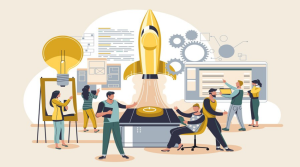E-learning in 2025 is more than just online classes. It's a living ecosystem of smart technology, human connection, and global opportunity. Whether you’re a high school student, working professional, or lifelong learner, the future of education is flexible, inclusive, and deeply personal. Let's delve into the key trends shaping this exciting transformation.
Personalized Learning
Artificial Intelligence (AI) has revolutionized e-learning by creating personalized learning experiences. AI-driven platforms analyze student behavior and adapt content to suit individual learning styles, ensuring that every learner progresses at their own pace. Intelligent tutoring systems and virtual assistants provide real-time feedback and support, making education more engaging and effective.
In 2025, AI-powered learning assistants and chatbots will become increasingly integrated into e-learning platforms. These intelligent tools can provide instant feedback on assignments, clarify concepts, offer personalized recommendations, and even help with study scheduling. This constant support will enhance learner autonomy and address individual learning needs more efficiently.
Immersive Learning with AR and VR
Augmented Reality (AR) and Virtual Reality (VR) have brought immersive learning to the forefront. From virtual science labs to historical recreations, these technologies offer hands-on experiences that were once limited to physical classrooms. Learners can now explore complex concepts in a highly interactive and engaging environment.
The future of e-learning is immersive. Virtual Reality (VR) and Augmented Reality (AR) technologies are poised to revolutionize how we experience online education. Imagine medical students performing virtual surgeries, history students walking through ancient Rome, or engineering students assembling complex machinery in a simulated environment – all from the comfort of their homes.
Gamification: Making Learning Fun
Gamification has become a key trend in e-learning, incorporating game-like elements such as points, badges, and leaderboards into educational content. This approach not only enhances motivation but also improves knowledge retention and critical thinking skills.
Microlearning: Bite-Sized Knowledge
In a fast-paced world, microlearning has gained popularity for its ability to deliver concise, focused lessons. These bite-sized modules are perfect for busy professionals and learners who prefer quick, on-the-go education.
Think concise video lessons, interactive quizzes, and gamified modules that can be easily consumed on the go. This approach caters to busy schedules and optimizes knowledge retention by breaking down complex topics into digestible chunks. Platforms will offer curated pathways of these micro-modules to build comprehensive skills over time.
Seamless Integration with Other Technologies:
E-learning in 2025 will seamlessly integrate with other emerging technologies. Think blockchain for secure and verifiable digital credentials, the Internet of Things (IoT) for context-aware learning experiences, and advanced data analytics to gain deeper insights into learning patterns and optimize course design. This interconnected ecosystem will create a more holistic and impactful learning journey.
The Power of Collaborative and Social Learning:
E-learning is no longer a solitary activity. The future emphasizes the importance of community and collaboration. Expect online courses to integrate more robust social learning features, such as virtual study groups, collaborative projects, peer-to-peer feedback mechanisms, and interactive forums.
These features foster a sense of belonging, encourage knowledge sharing, and provide diverse perspectives, enriching the overall learning experience. Learning is becoming more social again—with cohort-based models offering real-time interaction, peer support, and accountability.
Focus on Skills-Based Learning and Career Readiness:
The future of education is increasingly focused on equipping learners with practical skills that are directly applicable to the job market. E-learning platforms in 2025 will prioritize skills-based learning, offering more hands-on projects, simulations, and real-world case studies. Expect a greater emphasis on stackable credentials and micro-certifications that validate specific skills and enhance career readiness.
Accessibility and Inclusivity at the Forefront:
As e-learning becomes more mainstream, accessibility and inclusivity will be paramount. Platforms will strive to cater to diverse learners with varying needs, offering features like closed captions, transcripts, screen reader compatibility, and customizable learning interfaces.
The goal is to break down barriers and ensure that high-quality education is accessible to everyone, regardless of their background or abilities. Features like multilingual support, closed captions, and adaptive technologies ensure that education is inclusive and caters to diverse needs.
The Blurring Lines Between Formal and Informal Learning:
The distinction between formal and informal learning will continue to blur in 2025. E-learning platforms will increasingly offer pathways for lifelong learning, allowing individuals to continuously upskill and reskill throughout their careers. Expect more integration of informal learning resources like MOOCs, open educational resources (OERs), and community-driven learning initiatives into formal educational frameworks.
The Future of E-Learning:
The evolution of e-learning in 2025 promises a dynamic and transformative future for online education. By embracing personalization, immersive technologies, collaborative learning, and AI-powered support, e-learning is poised to become even more engaging, effective, and accessible.
As technology continues to advance, the possibilities for innovation in online education are limitless, paving the way for a future where learning is truly lifelong and tailored to the individual needs of every learner. Get ready to experience a revolution in how we acquire knowledge and skills.




